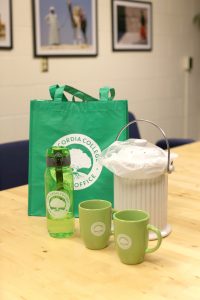
As part of Concordia’s latest step toward sustainability, offices across campus are going green.
The Green Office Program was implemented this fall under the guidance of Sustainability Coordinator Samantha Westrate. Funds for the program come from a private grant recently received by the college, part of which called for a staff sustainability development program.
“The Green Office Program is a way to kind of help get staff and faculty involved in sustainability on campus,” Westrate said. “The point of it was to educate individuals on campus so they just think about their actions and realize that individual actions, collectively, make a really big difference. If we want Concordia to be sustainable, it starts with every individual on campus.”
In order to become certifiably “green,” offices must follow five steps. First, each office must appoint a GO Representative, who serves as a point person for Westrate – filling out forms, coordinating an office meeting, and holding everyone in the office accountable.
Westrate emphasized that individual staff and faculty can also have their offices certified, in which case they would serve as their own GO Rep.
“If no one else in the office wants to do it, a single person can do it,” she said. “We wanted to make sure that we fit the program to empower individuals and departments at the same time.”
The GO Rep’s first job is to fill out the Green Office Pre-Certification Form. On this form they can request eco-friendly materials and office supplies, such as reusable coffee mugs, recycling bins, and “smart” power strips that prevent electronics from continuing to consume energy after being turned off.
Junior Derek Ludwig, an intern in Westrate’s office, has been working intently on the Green Office Program this semester. One of his tasks is to collect the results of office pre- certification forms and deliver the requested materials.
“It’s like Santa Claus, making everybody’s little gift bag and bringing it to their office,” he said.
Next, each GO Rep must fill out a formal certification application in which they take inventory of the actions their office is taking to be sustainable. Certification is granted according to a point system, in which actions are weighted based on the amount of effort they require to fulfill. Offices can be certified at levels ranging from Honorable Mention (0 to 9 points) to Platinum (80 to 100 points).
Once GO Reps have filled out the necessary paperwork, they must organize an office meeting along with the Office of Sustainability to review the application. Finally, when all is said and done, the office will receive a certification plaque.
Westrate and her team conducted a pilot program with the office of global learning this summer to find out what does, and does not, work for the program.
“We learned that there is not one set way to do it per office, that it’s really going to be based on each office, working with the people in the office to tackle their main sustainability issues,” she said. “It’s not a one-size-fits-all kind of program, but that’s the nice thing about being at a small school, you are able to take the time to work with individual groups on campus.”
While the program is still in its early stages, Westrate said that turnout has been far higher than expected. Already this fall, several offices – including facilities management, the business office, and human resources, as well as a number of academic departments – have begun work toward their Green Office certification.
Such a high volume of requests has slowed the program’s timeline, and no offices have actually certified any offices besides the pilot program. Beginning certification will be the next step in coming weeks, Westrate said.
The communication studies and theatre arts department was one of the first to become pre-certified. According to Mary Olek, office manager and GO Rep for the department, participating in this program is part of the CSTA department’s ongoing efforts to live and work sustainably.
“We’re doing quite a few things, and I know that there’s even more that we could do,” Olek said. “We are pretty conscious of recycling in our department.”
Prior to applying for the Green Office Program, the CSTA department already recycled cans, plastic, confidential and non-confidential paper, newspaper, magazines, ink cartridges, electronics, and cardboard. In order to build on their achievements in reducing waste, Olek submitted a request for water bottles, coffee mugs, recycled bags, eco-friendly cleaning kits, and “smart” power strips.
Those materials were recently hand-delivered to the department, and already Olek has noticed an increase in sustainable practices around the office.
“People are using their mugs, I’ve seen people using their water bottles, I’ve seen the bags,” she said. “I’m pretty excited about what we’re doing through this program.”
While the CSTA department has shown great enthusiasm, Ludwig said that some may be more hesitant to switch to sustainable practices. He attributes this not to a lack of concern, but of time.
“A big thing we’re learning is that people want to be green,” he said. “I have time to sit there and think about being sustainable because I’m an intern, and I have to sit there and think about the effects on the environment because I’m an environmental studies major, so this is basically what my life is going to be. People working 9 to 5 jobs, they don’t always have time to think about it.”
Ludwig’s hope for the Green Office Program is that it will show people how simple living sustainably can be.
“It’s kind of a new idea, being sustainable, so it’s hard to get the ball rolling,” he said. “If you want to get everyone on board and jump on the bandwagon, what easier way than to hook every office up with free stuff?”

